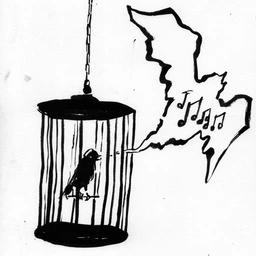- cross-posted to:
- brainworms@lemm.ee
- cross-posted to:
- brainworms@lemm.ee
Trickle down never worked, this is end game capitalism, something else needs to be added to this mix to fix this mess.
Capitalism naturally ends up in this position. That’s why it’s so hard to “fix” – to those at the top, nothing is wrong.
Exactly, capitalism is economic perpetual motion, you can’t have exponential growth in a finite system.
I might be wrong, but I think you mean infinite growth in a finite system.
You can have exponential growth in a finite system can’t you? As exponential is just that it gets faster and faster compared to linearly increasing variables.
I guess at some point growth has to stop being exponential in a finite system, but the same can be argued for linear growth I think.
Yeah I agree. It’s still called exponential growth, even if it’s temporary.
True, should be more like exponential growth in perpetuity or something but you get the idea.
Yes. Simple math.
And yet you already got a downvote for it.
It’s not regulated properly, that’s the problem
But those regulations are constantly labeled as “anticapitalist” – because they are.
Why is it so wrong to poke at the inner workings of capitalism? Why must it be infallible?
Because the people benefiting from its brokenness aren’t ready to stop salting the earth for numbers.
…I think you may have misread my comment.
I’m saying it’s broken and asking why it should be accepted as infallible.
I thought they were just agreeing with you, FWIW
You’re right - but I can see how the tone was interpreted as oppositional, I could have worded it differently to direct that more clearly. No harm afaik, lol.
Capitalism really is trading goods for currency, and allowing lending and investment. What’s going on though, with unchecked companies and laughable fines, ruins the whole thing. In its current state, capitalism will be our undoing, but with proper laws, regulations and oversight, it could work.
The problem is, corps have grown too powerful already and can blackmail governments. It’s like other models that could work in theory, but never benefit the people in the end. Communism tends to lead to tyranny, for example.
People are just really shit at designing and running big societies.
Capitalism isn’t trading good for/with currency though. Socialist and Communist societies would still use currency as it is a lot easier than bartering everything. And in Socialists society, you can still have lending and investments.
Capitalism is the means of production and trade owned by private entities (be it a person or a corporation) to make profits.
You are right though, inevitably, capitalism leads to consolidation and monopolies which we see today.
This “barter” economy as a primary means of exchange never existed. It’s a myth and a lie created by capitalists (actually by one Adam Smith) trying to rationalize the adoption of coinage and currency in ancient civilization.
In fact barter economies tend to arise predominantly in capitalism during periods of economic instability. Ie: after natural disasters, in war torn countries, etc.
The proper term you are looking for is “gift economy” and it is how the world worked before capitalism. I want something from you so you gift it to me with the implicit understanding that if in the future the roles are reversed I give something to you of relatively equal perceived value.
It was actually pretty rare that gifts were paid back in full in one transaction and often larger gifts were paid back through a series of transactions.
TIL that during the 16th to 19th centuries the aristocrats benefited from a “gift economy” because no one who ever says this knows what Mercantilism was.
deleted by creator
Capitalism, Socialism and Communism are only how the means of production/trade is owned. Wage labor can still exist.
In capitalism, the means of production and trade are owned by private entities. Worker trade their labour for a set wage. All the profit goes to the owner/shareholder.
In socialism, the worker owns the means of production and trade. If a coop is more profitable than the next one, the worker of the first coop get more money. The profits are distributed amongst the workers that produced the goods. The workers own the coop/company.
In communism, the state owns the mean of production. The profits of the coop/company goes back to the state and are then redistributed in the society.
Socialism can still have investment, but the returns necessarily be money. A certain good is needed. The worker pool their money to build a factory and make a successful product. The workers then get a return on their investment (they make more money than they initially had).
Trading with currency is the basis for capitalism. Capitalism is lending/investing. When you don’t have any actual wares at hand, but currency, virtual value, you trade for higher future virtual value.
You could barter cows and still be in a capitalistic society. It just wouldn’t be
Currency is just a way to simplify a transaction. I have a cow thatis valued at 100$. I get 100$ that I then spend on whatever. I don’t need to trade a cow for a 100 eggs, then keep 10 eggs and trade for butters.
Lending isn’t inherently capitalistic. I can lend a 100$ to my friend to start a business and he gives me back a 100$ after a time, no interest.
Colonial America enters the chat
let me bootstrap our national bank by using slaves a collateral.
Capitalism really is trading goods for currency, and allowing lending and investment.
That’s commerce. Commerce predates capitalism, by a lot.
Capitalism also involves other things that go beyond basic commerce, such as systems of property law to incorporate quasi-sovereignty to capital ownership. That’s more or less where we get the default model of businesses as de facto dictatorships ruled by the owner, vs. being democracies organized by stakeholders or participants. It’s a big, deep subject that’s unfortunately talked about in reductionist terms a lot. It’s probably not helpful that a lot of early (and recent) scholarship on capitalism seems to frame itself as revelation of the nature of capital and markets, as if capital and markets are natural forces and not man-made things.
This last bit- treating capital and economics as if they were laws of nature (instead of being contrived by men)- does a lot of work to obfuscate fundamental systems of power, which in turn helps keep that power unaccountable. One major source of tension between capitalism and socialism has to do with whether the sovereignty of ownership ought to be democratized or subject to democratic accountabilities.
Some examples of being subject to democratic authority is basic labor protections, the 40 hour work week, safety regulations- if the voters impose on employers the requirement that employers provide a safe working environment, it’s a counterweight to the general notion that owning the business makes one king of everything in that sphere- that is, it subordinates capital to the authority of the polity in which it operates.
I don’t think you understand how concentrated power causes society to serve the few over the many.
As long as the disparity in wealth (power) grows, more people are incentivized to serve fewer. It’s why we see the government controlled by the wealthy. It will always be this way (and get worse) so long as the disparity in wealth continues to grow.
This is by design.
Regulation and reform isn’t anti-capitalist though.
“Real” anti-capitalism lies in the realisation that this system cannot be reformed, the status quo must be dismantled if we ever want to move past it and truly work towards values of freedom and equality.
That distinction would be a hard sell for most capitalists I know. Regulation itself is seen as tampering with the “free market”, and therefore anticapitalist.
Unfortunately for capitalists, the “free market” isn’t the defining (nor exclusive) feature of capitalism. Profit and private ownership is.
Capitalism isn’t infallible. Externalities to capitalism are well-understood.
The problem is that the particular criticism being leveled there is nonsensical. We don’t live within a finite system. New avenues of growth are constantly appearing, in both “typical” production methods and, most especially, service sector.
The idea that capitalism even requires infinite “growth” is problematic because “growth” is indefinable in the way this criticism is being leveled.
To add on, this criticism is generally leveled by “de-growth” elements of socialists/communists, who also cannot explain why those systems don’t also require “growth” to provide for increasing numbers of people or how “growth” can be offset aside from simply not providing enough resources for people, which has unpleasant undertones.
You’re splitting hairs about what people call growth when the term is used most commonly to refer to the ROI and the issue with sustainable business. A perfectly sustainable business is viewed unfavorably if it doesn’t generate increased revenue beyond inflation. I.e. a company makes a revenue jump but no “new profits”, it gets sandbagged.
The coop business model says “profits” get returned to member/owners as capital credits. Everyone employed can still do really well, members get value for their money, and investors can go fuck themselves.
We need more co-ops.
All* businesses that don’t make money are viewed unfavorably because they aren’t succeeding.
*Except, ironically, businesses buoyed by investment capital
You have been banned from c/Conservative.
Exactly. Capitalism is, ultimately, a variant of the Pirate Game, which has some spectacularly unintuitive results.
Of course, unfortunately, replace the word “capitalism” with pretty much every at scale economic “system”, and you get similar results: some group granted authority and power over the rest and “everythings fine” even when they are not.
You just described all major human societies over the ages. The issue is corruption and exploitation regardless of the core sociopolitical idealogy.
Trickle down didn’t work in the 1980’s or anytime after that.
Trickle down did work in the 1940’s, 1950’s, and most of the 1960’s, it just wasn’t called “trickle down” at that time.
The difference was a punitively high tax rate that nobody actually paid, because they found better ways to spend their excess revenue than simply giving it to Uncle Sam.
It turns out that when the richest among us are forced to spend instead of lend, the rest of us finally start to earn fair wages.
Well, that’s not really “trickle down” as championed by Reagan, that’s more “use it or lose it”. He wanted to reduce those crazy high tax rates to give the rich the choice of whether to keep the money for later or to spend it now, with “trickle down” being the phrase to tell people that it’s fine, it’ll make it’s way out to everyone else… eventually?
Yeah, that and the “rising tide lifts all boats”. He neglected to consider that most of us had “run aground” between the 60’s and 80’s.
It only worked for white people, not people of color
People of color were certainly repressed during this time frame, but not because of punitive tax rates on the highest incomes.
I can’t think of any mechanism wherein people of color in the 1940s through the mid 1960s would have been better off if rich people were taxed lower. So, I would have to disagree with your assessment: The confiscatory top-tier tax rate did, indeed, benefit people of color, just not nearly enough to offset the harms of legislated segregation and institutional racism.
something else needs to be added to this mix to fix this mess
Could Universal Basic Income play a role in this?
Band aid solution. The system remains unchanged. The billionaires still make their profits off of the backs of you and me.
UBI wouldn’t aim to get rid of billionaires since they would also receive payments. But it would help get rid of poverty, no?
By itself, probably not. I mean, it’s not a bad idea, but it would probably just drive inflation through the roof.
The part of UBI that would be most beneficial would be the tax structure needed to pay for it. The wealthiest among us would go out of their way to avoid such taxation, and in doing so, they would buy more, spend more, charge less. All the activities they undertake to avoid taxation end up as income to the people they buy from.
Well at least after AI and robots replace a good portion of the workforce, detaching happy, educated citizens from the societies money flow.
My guess is gouverment by powerful corporation and people unable to adapt dying in gutters, rather that universal income.
There was a “this day in history” tidbit a day or two because it was the anniversary of the last guillotine execution.
The last so far.
This is where it’s time to revisit why and how the economy fared so well in the USA when high top marginal tax rates incentivized top earners (and business owners) to spend on things that got them something when the alternative was paying 90% on money above the line to be in that bracket.
When that money was spent on higher wages or hiring more people or funding pensions or on research & development, the result was growth and a prosperous middle class. The super-wealthy were still super-wealthy, the major difference was that high top marginal tax rates created incentives for them to spend their money in ways that actually did trickle down
Indeed, “use it or lose it” versus “keep it and we presume you might use it… one day”
surges
Forgive me if I wait for changes before believing anything is happening. Shit surged a long time ago.
Covid facilitated the greatest transfer of wealth from the masses to the few in human history.
Ehhh Colonialist Spain would likely have a few choice words about that
Globally? Or just them?
They had a global empire
Really?
Yes. They stole so much gold it crashed their economy, ironically
They’re just getting the message, now.
Let’s set aside all moral debates about freedom, punishing prosperity, blah blah blah.
There is one very simple and practical reason to tax the rich:
because that’s where all the money is
Removed by mod
And the people who don’t have any money keep voting for the people who are the worst about this
74% of it, in fact, concentrated into the hands of the wealthiest 10% of Americans.
If we don’t tax the rich, they will only continue to get richer while everybody else gets poorer and the economy continues to fall apart as we print more and more money to keep everybody paid and it all gets vacuumed up to the top.
It seems like solid economics. We need to keep capital in motion. 10% of the population cannot meaningfully deploy 74% of the capital.
To quote the 1985 movie Brewster’s Millions, it doesn’t count to buy the Hope Diamond for some bimbo as a birthday present.
We’re seeing so many economic problems being caused too much wealth being concentrated. Supply side economics was a stupid idea from the outset, but now we’re in the supply side economics endgame.
The wealthy are using that wealth to make products no one needs while people are struggling to afford the things they actually do need. $3500 for Apple goggles? We don’t need that and couldn’t afford it if we did. How about yet another streaming service? Don’t need it, can’t afford it. Maybe some VR goggles the you can use to go into a virtual world where you’re a legless cartoon character? We’ll rename the company after this new product, that’ll get people to buy it for sure!
Well shit, it seems the wealthy have so much money, they don’t have anywhere to put it. Doesn’t seem like enough people are buying the products they develop with that wealth, so what can they invest that money in? I know, maybe they should put it into real estate! Great, now ordinary people can’t afford a place to live. Yay, supply side economics is working great!
Isn’t the usefulness of ventures rewarded or not by the efficient market? I really like VR. An emerging market like that is bound to have some design dead ends and wasted money.
What efficient market?
This is one of the main factors behind my vote this year.
That, free dental, and also keeping the ocean from getting too close to my house.
Removed by mod
Removed by mod
Removed by mod
A weaker message.
Guillotine is a quick painless death.
Tar and feathering is an excruciating, often fatal, always disfiguring punishment, where the sufferer is meant to appear as a bird.
I’m going to disagree with you, would take guillotine to tar and feathering any day.
Is anything ever going to happen though?
Sure, once the people who have their entire campaign funded by these rich people vote on our behalf
The calls are growing up so fast, like weeds. /s
deleted by creator
We, the wealthy ALREADY pay all of the taxes, lazy poors need to stop complaining! They drive around in fancy cars that they bought with their food stamp money
NOTE TO DOWNVOTERS: @MrBusinessMan@lemm.ee is a parody account. Their comments are always a caricature of things wealthy/business people say. They don’t use /s flags to indicate sarcasm. I am not this person, but I’ve seen them comment elsewhere and usually people understand the sarcasm.
People on the lemmyverse are just as stupid as the average redditor it seems













